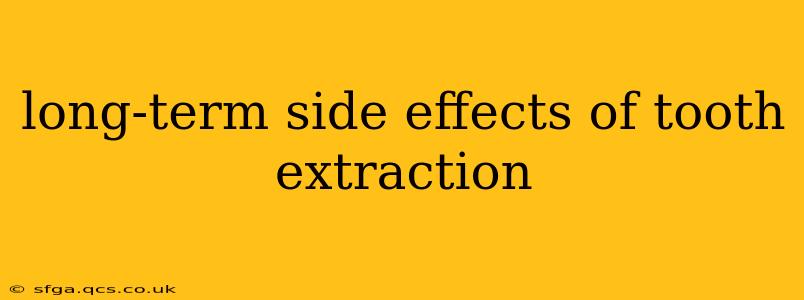Tooth extraction, while a common procedure, isn't without potential long-term consequences. Understanding these potential side effects is crucial for making informed decisions about your oral health. This guide explores the various long-term effects, addressing common concerns and providing insights into mitigating risks.
What are the potential long-term side effects of tooth extraction?
The most common long-term side effects relate to bone loss, changes in facial structure, and the potential for neighboring teeth to shift. While many individuals experience minimal issues, others may face more significant challenges. The severity often depends on factors like the number of teeth extracted, the location in the mouth, and individual healing responses.
Can tooth extraction lead to bone loss?
Yes, tooth extraction can lead to bone loss. The jawbone relies on the stimulation of teeth roots to maintain its density. When a tooth is removed, the bone in that area gradually resorbs (breaks down) over time due to lack of stimulation. This bone loss can be significant, especially in the absence of appropriate restorative measures like dental implants or bone grafts. The degree of bone loss varies depending on several factors, including the individual's age, overall health, and the specific location of the extraction.
What are the effects of bone loss after tooth extraction?
Bone loss after tooth extraction can lead to several problems, including:
- Altered facial structure: Significant bone loss in the jaw can lead to changes in facial contours, potentially causing a sunken or hollow appearance.
- Difficulty with dentures: Bone loss makes it more challenging to fit and maintain dentures, leading to discomfort and instability.
- Increased risk of further tooth loss: The weakening of the jawbone can destabilize adjacent teeth, making them more prone to shifting or loss.
How can I prevent bone loss after tooth extraction?
Several strategies can help minimize bone loss after tooth extraction:
- Dental implants: These are the most effective way to prevent bone loss. The implant acts as an artificial tooth root, stimulating the jawbone and maintaining its density.
- Bone grafts: If significant bone loss has already occurred, bone grafting can restore the lost bone tissue, providing a solid foundation for implants or other restorative treatments.
- Regular dental checkups: Monitoring the healing process and jawbone health is essential for early detection and intervention.
Does tooth extraction affect my bite?
Yes, tooth extraction can affect your bite. The loss of a tooth can cause a shift in the position of your remaining teeth, potentially leading to malocclusion (improper bite alignment). This can result in:
- TMJ problems: Changes in bite can strain the temporomandibular joints (TMJ), causing pain and dysfunction.
- Increased wear and tear on teeth: Misaligned teeth can experience increased wear and tear, potentially leading to further dental problems.
- Difficulty chewing: An altered bite can make chewing more difficult and uncomfortable.
Are there any long-term risks associated with wisdom tooth extraction?
Wisdom tooth extraction, in particular, carries some unique long-term risks. These include:
- Nerve damage: The inferior alveolar nerve, which supplies sensation to the lower lip and chin, can be damaged during wisdom tooth extraction, potentially resulting in numbness or tingling. While often temporary, permanent nerve damage is a possibility.
- Dry socket: While more common in the short term, dry socket (alveolar osteitis) can sometimes have lingering effects, causing prolonged pain and discomfort.
What should I do if I experience long-term problems after tooth extraction?
If you experience any persistent pain, discomfort, or changes in your bite or facial structure after tooth extraction, it’s crucial to seek professional dental advice immediately. Early intervention can often prevent more serious complications. Don't hesitate to contact your dentist or oral surgeon for a follow-up examination.
This information is for general knowledge and does not constitute medical advice. Always consult with a qualified dentist or oral surgeon for personalized advice and treatment regarding your specific situation. Remember, proactive care and regular dental checkups are essential for maintaining optimal oral health.
